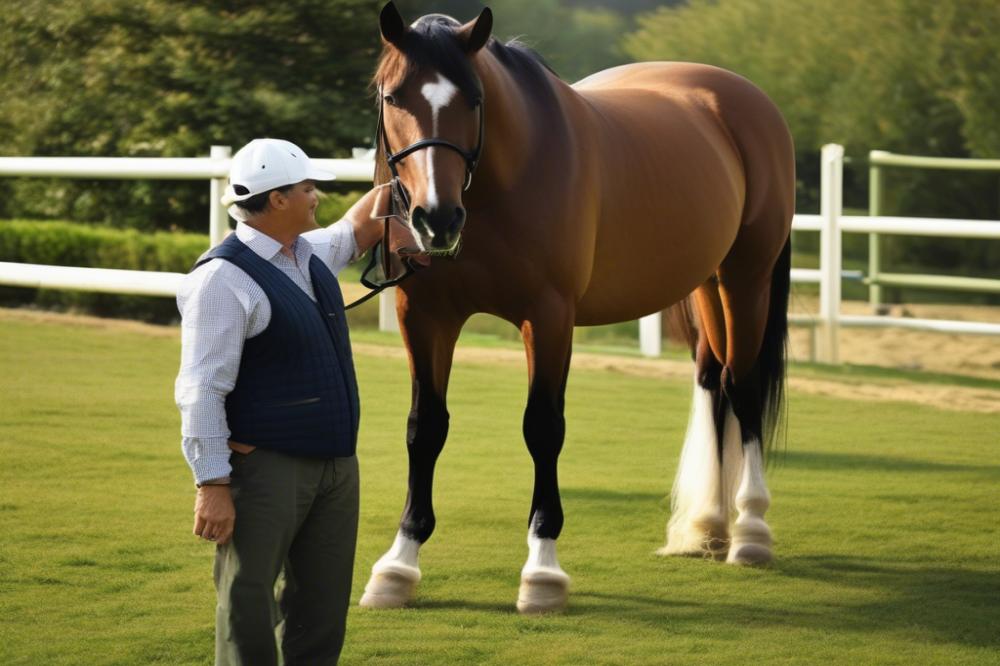Building a Reputation as a responsible breeder
Responsible breeding is vital in the equine world. It goes beyond simply producing offspring. Those who engage in this practice must prioritize health, temperament, and overall quality in each horse they breed. Horse breeding can greatly affect animal welfare. Poor breeding choices can lead to health issues and behavioral problems later in life. Recognizing this is crucial for anyone in the industry.
A breeder’s role is significant. They must follow ethical standards that consider the well-being of the horses. This commitment manifests in various practices, such as proper veterinary care and balanced nutrition. Understanding basic genetics also plays a role in creating strong, healthy animals. Ethical responsibilities also mirror those seen in dog breeding ethics. Every decision can impact future generations.
This article will focus on strategies to build a solid reputation as a responsible breeder. Readers will discover practical approaches that foster trust and compassion in breeding practices. Each method discussed will emphasize the importance of transparency and accountability. By adopting these strategies, individuals can not only improve their reputation but also contribute positively to the welfare of animals in their care.
Understanding Responsible Breeding

A responsible breeder is someone who prioritizes the health and well-being of animals. This type of breeder focuses on producing healthy puppies or kittens, as opposed to just increasing numbers. ethical breeding practices play a major role in this commitment. They set the standard for how animals are treated throughout their lives, from conception to placement in new homes.
Animal welfare is at the forefront of responsible breeding. It involves considering the genetic background of breeding animals. Only healthy and well-tempered animals should be bred. This practice reduces the likelihood of inherited health issues, benefiting not just the animals but also the families that adopt them. Responsible breeders often conduct health screenings to identify any potential problems. The priority is always the well-being of both the mother and her offspring.
Breeding standards are crucial in establishing a community of responsible breeders. These standards provide guidelines for health, genetic diversity, and care. Adhering to them fosters trust within the community. Potential pet owners can feel more confident knowing that they are choosing animals bred under ethical conditions. Meeting these standards also elevates the overall perception of breeders in society.
Educational resources can assist both breeders and pet owners. They cover a variety of topics, from responsible breeding methods to understanding breed-specific needs. Awareness about the importance of responsible breeding practices can lead to informed decisions. As a result, this contributes to better lives for pets and their families. Every step taken toward ethical breeding has a positive impact on animal welfare.
Health Testing and Breed Selection

Health testing is a vital step in responsible breeding practices. Breeders must conduct various evaluations to identify genetic disorders. These tests can include screenings for common health issues in specific breeds. For example, some tests screen for conditions such as hip dysplasia or certain heart diseases. Testing not only protects the animals but also supports future generations. Reliable data about a horse’s health can help in making informed breeding choices.
Breed selection is equally crucial. It is important to choose breeds known for good health and a balanced temperament. Horses vary significantly across breeds in terms of behavior and physical attributes. Select breeds that fit your purpose, whether it’s for riding, competing, or companionship. Each breed comes with its own set of strengths and weaknesses. Understanding these differences can lead to better matchups for training and activities.
Moreover, health testing reflects on a breeder’s reputation. Having a solid health testing protocol can enhance trust among potential buyers. When breeders prioritize the health of their animals, they contribute to a positive image in the community. Buyers are more likely to choose breeders who show commitment to animal welfare. This trust leads to a lasting relationship between breeders and horse owners.
Long-term animal welfare is a shared responsibility. Health testing plays a role in reducing the incidence of hereditary diseases. Responsible breeding practices can produce healthier, more resilient horses. When breeders focus on good genetic practices, they help ensure that future generations thrive. A conscientious approach to breeding results in horses with better life spans and quality of life.
Additionally, considering temperament is essential. Horses with good behavioral traits tend to adapt well to various environments and jobs. This adaptability can lead to happier, more productive animals. Owners appreciate when a horse has been bred with temperament in mind. It generally leads to mutual enjoyment for both the horse and its handler.
Implementing Responsible Practices

Key responsible practices are essential for horse breeders. First, developing clear breeding policies is crucial. These policies should focus on the ethical treatment of all horses involved in the breeding program. Every breeder must prioritize the health and well-being of the animals. Regular veterinary check-ups should be a standard part of this process. Horses must receive vaccinations and proper health care to live long and happy lives.
Next, kennel management plays a significant role in breeding success. A well-maintained facility can prevent health issues and stress among horses. Clean environments contribute to the overall welfare of the animals. Proper nutrition is another vital factor. Horses require balanced diets tailored to their specific needs. This includes enough vitamins and minerals to support growth and reproduction.
Responsible breeders also establish strict criteria for selecting breeding animals. These criteria help prevent hereditary health problems. An emphasis on genetic quality can lead to stronger, healthier offspring. Regular assessments of breeding stock should occur to ensure their vitality and fitness. Attention to these details not only benefits the horses but also builds trust within the community.
Moreover, ethical breeding practices support transparency. Keeping detailed records helps track lineage and health outcomes. This transparency fosters accountability within the breeding program. Engaging with other breeders promotes sharing best practices and learning about new techniques. Success in the breeding world comes from continuous education and open communication.
Lastly, an ongoing commitment to high breeding standards is necessary. Staying informed about the latest advancements in equine health and breeding techniques can set a responsible breeder apart. Networking with veterinarians and industry experts can provide valuable insights. Continual improvement should be a goal in all breeding programs. The aim is to contribute positively to the larger horse community.
Building Your Breeder Reputation
Cultivating a strong reputation as a breeder is essential for gaining trust in the community. Potential buyers look for breeders who prioritize the health and well-being of their animals. Transparency is key in this process. Open communication helps build a relationship with prospective pet owners.
Sharing details about your breeding practices is important. Discussing your methods allows buyers to understand your dedication to responsible breeding. Provide information about your animals’ lineage and care routines. When people know where their future pets come from, they feel more connected to the process.
Importance of Transparency and Communication
Honesty during discussions is crucial. Being clear about your breeding practices shows that you care about your animals. Moreover, it reassures potential buyers that they are making a sound choice. Encourage questions from interested parties. Answering their inquiries promptly builds confidence and trust.
Consider using social media to promote your breeding practices. Sharing updates and pictures of your puppies or kittens can engage potential owners. Responding to comments and messages shows that you are approachable. This interaction fosters a friendly atmosphere where people feel valued.
Strategies for Marketing as a Responsible Breeder
Highlight ethical practices in your marketing. Offer details about any certifications or memberships in breeding organizations. This can emphasize your commitment to humane practices. Additionally, showcasing health testing results is an effective way to attract buyers. Prospective pet owners want to know that their future companions are healthy and well-cared for.
Consider creating brochures that outline your breeding standards. These could include information on responsible pet ownership, care tips, and the importance of socialization. Handing these out at local pet events can help spread awareness of your brand.
Utilizing a website to display your breeding philosophy can also make a difference. Include testimonials from previous buyers. This not only displays your successes but also gives insight into the satisfaction of past customers. Regularly updating content keeps your audience engaged and interested.
Engaging with the Community
Having a strong connection to the community plays a vital role in building credibility as a breeder. Active participation in local events fosters relationships with potential puppy owners and other professionals. Establishing trust through meaningful interactions can lead to lasting impressions with the public.
Networking is key to promoting responsible practices. Joining forces with other breeders and organizations helps create a supportive environment. Sharing knowledge and experiences not only benefits individual breeders but also uplifts the entire community. When breeders unite, they can advocate for animal welfare more effectively.
Becoming involved in breeders’ clubs is another excellent way to gain visibility. These clubs serve as platforms for sharing valuable insights about ethical breeding. Attending events allows breeders to display their commitment to the welfare of animals. Engaging in discussions about best practices enhances everyone’s understanding of proper care methods.
Volunteering for local shelters also demonstrates dedication to animal welfare. Contributing time and resources can strengthen community ties. Many shelters welcome help with events, fostering a spirit of cooperation. A positive reputation is often built through acts of kindness and a willingness to give back.
Creating educational workshops can further establish authority. By teaching responsible breeding techniques, a breeder can become a respected resource. These events provide an opportunity to clarify misconceptions about breeding and care. They also offer a chance to answer questions from the public, promoting transparency.
Participating in fairs and exhibitions can highlight a breeder’s commitment to their craft. These gatherings allow interaction with the community in a lively setting. Visitors often appreciate the chance to learn about different breeds and responsible practices. Such exposure can lead to new connections and future partnerships.
In summary, community engagement is an essential component of building a strong reputation. Through active participation, networking, and education, a breeder can create a positive impact. Emphasizing collaboration and care will resonate with both new and seasoned pet owners. Sharing a passion for animal welfare helps pave the way for a more responsible future in breeding.
Wrapping Up on Responsible Breeding
Being a responsible breeder carries immense significance in today’s animal care community. It goes beyond just producing healthy puppies; it involves a commitment to ethical breeding practices that prioritize the well-being of each animal. By applying the strategies discussed throughout this article, breeders can build a strong reputation that resonates with potential puppy owners and fellow breeders alike.
Practices such as prioritizing health testing, maintaining clean living environments, and providing comprehensive puppy care show a breeder’s dedication. Each of these actions contributes to a positive image within the breeding community. As more people recognize these efforts, trust in breeders increases. This encourages responsible ownership and helps to create better homes for future pets.
Breeders play a critical role in promoting humane treatment of animals. Upholding high standards influences not only individual breeding practices but also impacts the broader community. Shared knowledge and best practices can lead to healthier dogs and improved overall breeding standards.
Ultimately, the journey toward building a solid reputation as a responsible breeder is ongoing. Commitment to ethical choices and quality care should never waver. The responsibility lies not just in producing puppies but also in nurturing a supportive environment where animals can thrive. This dedication will pave the way for a successful future in breeding, benefiting both animals and their forever homes.



